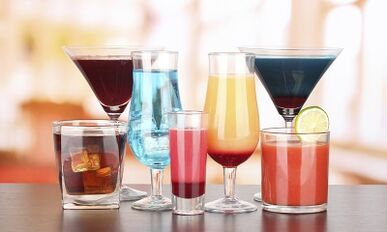
It is not enough to get to know your "norm", it must be able to calculate it correctly without losing the size of the drinks, forts and glasses. In order for people to watch how much they drink, in 1987 the concept of "unity" was introduced in the UK - the unity of alcohol. This method of accounting for alcohol enhancement was very convenient and was put into operation in other countries around the world.
One of the alcohol units is the same as 10 ml or 8 g of pure ethanol, which is approximately equivalent to the amount of alcohol that an average adult can process within one hour. Theoretically, this means that there is almost no trace of alcohols in an adult's blood within an hour, although the alcoholic elimination of individuals may be different from the body.
There are alcohol standards allowed as above, which are excessive dangerous to health. This:
- up to 3-4 units of alcohol per day for men;
- Up to 2-3 units of alcohol per day for women.
It should be noted that this does not indicate the average consumption of alcohol in a few days, namely the maximum allowable alcohol in one day.
However, the number of strong drinks should not exceed the week:
- For women - 14 units;
- For men - 21 units.
If the previous day has drank excessive amounts of alcohol, refrain from alcohol for the next 48 hours.
From units to "drin"
The number of alcohol units in the drink depends on the fort and drunk volume. So:
- A glass of wine (250 ml) of a 12% fort for approx. 3 units contain alcohol;
- 5% of the Fortress Bank of Ser (1 l) contain about 4 units of alcohol;
- 40% of a pile of vodka (25 ml) forts contain about 1 unit of alcohol.
Thus the permissible daily norms on average:
- a glass of wine at dinner;
- About an ordinary fortress for beer;
- 2-3 small vodka pile.
For lovers and cocktails with exotic alcohol, the formula will be useful to calculate the number of units in any volume of various drinks:
- Fortress (%) X volume (ml) ÷ 1000 = alcohol units.
How to reduce alcohol damage?
Once into the body, alcohol is absorbed in the stomach and then blood flow to the blood through the body, easily penetrating all tissues and organs. The maximum concentration of alcohol in the blood is about an hour after use, the strongest intoxication and euphoria time. Alcohol then enters the processing.
In the first stage, a water molecule disappears from ethanol and forms vinegar aldehyde forms. This is a poison for the body, and the following hangover and intoxication are associated with it. In the second phase, aldehyde is converted into acetic acid, which is non -toxic and is destroyed by carbon dioxide and water. Two enzymes are controlled by alcohol divisions: alcohol dehydroginase (ADG) and acetaldehydehydehydehydehydehydehyde from ALDG). The speed of their work is a congenital genetic property.
For a person with a fast adg and ALDG, alcohol in the body does not remain and the aldehyde is rapidly harmless. Such a person is slowly drunk and does not suffer from strong hangover. People with slow enzymes say they do not know how to drink: they quickly reach the crazy condition replaced by a serious hangover. But the worst of all those who have a fast adg and a slow Aldg. Such people are not drunk for a long time, and they manage to drink more than laid, and rapidly formed vinegar aldehyde remains in the body for a long time and has a detrimental effect.
Accordingly, the power of intoxication and subsequent intoxication depends largely on the degree of drunk and inheritance. There are tricks that allow slightly reduction in alcohol damage. To do this, slow down the absorption of alcohol from the stomach or reduce the amount of alcohol taken by "collar".
- The spying of alcohol (beer, champagne) cannot be mixed with strong drinks. The carbon dioxide of "magic bubbles" accelerates alcohol absorption and increases the concentration of blood and therefore the severity of the hangover.
- Hot alcohol (punch, grog) and enriched wines must be moderately drunk for the soul. Sugar and high temperatures accelerate alcohol flow into the blood and acetaldehyde formation.
- Before and during the holiday, you should eat well, especially fatty foods. In this case, alcohol assimilation slows down and its damage is reduced to a minimum. An empty stomach alcohol can lead not only to rapid intoxication but also to dangerous hypoglycaemia.
- Stretch the time between the toast and drink a small amount of piles and glasses to reduce the concentration of alcohol in the blood.
- Do not drink aspirin before and during a holiday. Acetylsalicylic acid slows down the absorption of alcohol, but causes ulcerative damage to the stomach and increases the risk of bleeding.
- Caffeine extends the desktop activity period, but in combination with alcohol, it can lead to a hypertensive crisis and heart rhythm.
If you often have to drink alcohol, it is useful to perform a biochemical test 2-3 times a year and visit the therapist. The effects of alcohol are recommended for the effects of alcohol to protect the liver and brain by the course of the vitamin preparations prescribed by the doctor.
Do you have to drink for "health"?
Contrary to widespread opinions, there is currently no convincing evidence that moderate amounts of alcohol are the advantage of the heart and cleans the blood vessels. There is no evidence that alcoholic beverages have the benefits of influence on the cardiovascular system.
Therefore, do not drink alcohol with alcohol, the aim of which is "therapeutic" for those who do not have such a habit. The use of small and medium doses of alcohol is not the prevention of cardiovascular disease.































